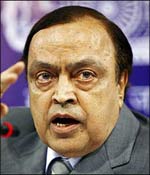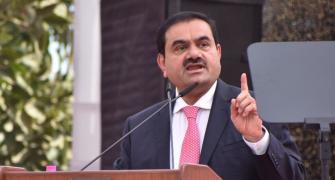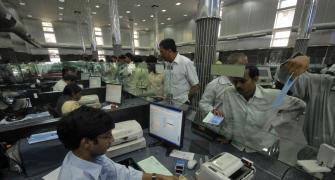 Petroleum minister Murli Deora, an otherwise able administrator, may earn the distinction of presiding over the fall of individuals and institutions in oil sector in a year when he also faced accusations of taking sides in corporate battles.
Petroleum minister Murli Deora, an otherwise able administrator, may earn the distinction of presiding over the fall of individuals and institutions in oil sector in a year when he also faced accusations of taking sides in corporate battles.
The year 2009 would arguably go down in history as perhaps the most controversial year for the oil sector in independent India.
Controversies raged in perhaps every sphere of the sector from accusations against upstream regulator directorate general of hydrocarbons to the role of downstream regulator Petroleum & Natural Gas Regulatory Board in grant on city licences.
Deora's achievement of being the only petroleum minister to return to office may well be forgotten under the blistering attack Anil Ambani launched on him for allegedly siding with his elder brother Mukesh in the gas supply row between them.
Anil first used the annual general meeting of his group firm Reliance Natural Resources Limited, which is seeking gas from Mukeshs Reliance Industries as per terms enshrined in a private family memorandum of understanding that split the Dhirubhai Ambani Empire between the brothers, to attack Deora's policy of giving government a role in approving price of gas and its usage.
It was followed by an advertisement campaign and numerous media conference calls, where questions were not taken, to accuse his ministry of helping Mukesh wriggle out of the family agreement.
The provocation was Deora's assertion that national resources cannot be divided in private pacts and has to be used in larger public interest.
Deora carried this assertion to the Supreme Court where a Bombay high court ruling asking gas to be given to Anil's firm as per family MoU was challenged.
The three-way fight between Mukesh, Anil and Deora, both inside and outside the court, consumed almost the entire second half of 2009 when a massive drop in international oil prices could have been used to deregulate auto fuel prices.
India's largest auction of exploration areas under NELP was ruined with global biggies staying away over uncertainty on NELP provisions that had been challenged in the Supreme Court.
After all, the year that began with government coming down heavily on oil PSU officers after a three-day strike by them stalled oil and gas production and crippled fuel supplies, promised to be an eventful year.
Deora was more rooted in political reality than his predecessor Mani Shankar Aiyar who he replaced in January 2006, yet his track record of governance, or lack of it, has been dismal.
To his credit, he has presided over the exit of the finest executives public sector oil firms have got first Subir Raha was denied an extension of service as head of ONGC in 2007, then P Banerjee was shown the door before he attained the age of super-annuation at GAIL.
Now, it seems Sarthak Behuria, chairman of Indian Oil Corporation, is set to meet the same fate.
The year began with international crude oil prices shaved off over $100 from the historic peaks of $147 a barrel of August 2009 but Deora missed the opportunity to free petrol and diesel prices.
With crude below $40 per barrel, deregulation could have been provided an ideal platform.
Instead, public sector oil firms were asked to cut retail prices keeping the General Elections in mind and when there was a rebound in rate, they started bleeding.
The government failed to put in a consistent compensation or subsidisation policy, leaving the three retailers IOC, Bharat Petroleum Corporation Limited and Hindustan Petroleum Corporation Limited in red.
It continued to ignore call by private retailers to provide level playing field, either by giving them subsidy at par with public sector units or deregulating the sector, leaving consumers with little choice.
Though the decline in crude prices gave Reliance Industries and Essar Oil an opportunity to reopen the petrol pumps they shut in 2008, governments policy deterred them from expanding the network.
The ambitious programme to dope 5 per cent ethanol in petrol got derailed because of non-availability of sugarcane- extract while PSU refineries lagged in completing fuel upgradation projection that would enable them to produce Euro-III and IV petrol and diesel from April 1, 2010.
The mid-stream pipeline business was in equal disarray with regulator PNGRB not sanctioning a single cross- country pipeline to connect gas sources with consumption centres.
More confusion was added with Deora proposing to take away this function from PNGRB and create a new pipeline authority.
Bill for the same is yet to get a final draft.
PNGRB added to woes of consumers with lopsided regulations on city gas distribution networks that sell compressed natural gas to automobiles and piped gas to households. Instead of targeting cities where compressed gas distribution was yet to begin, it picked on existing service providers in cities like Delhi and Mumbai over their authorisation.
It finally relented but before some went to courts, bringing the entire process of grating licence to new cities to a standstill.
The upstream sector was the most chaotic with flip-flops on availability of tax holidays for gas production creating uncertainty over multi-billion dollar investment in deep-sea fields.
Then there was the controversy over the marketing freedom for gas produced from NELP blocks.
While Deora believed operators had freedom within the broad framework of governments utilisation policy, others felt he had robbed operators like RIL of their promised freedom.
The Ambani gas battle had its fallout on the upstream nodal body directorate general of hydrocarbons which lost its credibility as an institution after its then head V K Sibal was accused of colluding with private firm for personal favours.
He was denied an extension of service on adverse report on Central Bureau of Investigation on the charges, he had vehemently denied.
There was bright spots, first with RIL began gas production from its eastern offshore Krishna Godavari D6 fields, that helped states like Andhra Pradesh turn power surplus in summer months.
Peak output of 80 mmscmd would wipe out most of gas deficit in the country but doubts remain when this would be achieved as customers named by government are yet to take their entire allocated quantities.
Also, Cairn India, unit of Scottish explorer Cairn Energy Plc, began crude oil production from its Rajasthan field, most prolific onland discovery in more than two decades. First the global slowdown in demand and on top of it the absence of any clear direction led to public sector oil firms mostly operate on auto-modes with almost nil activity on diversification and expansion front.
All that refiners IOC, BPCL and HPCL did was refine oil and sell fuel with a fire at a fuel depot in Jaipur being the only spot when the media spotlight turned on them.
Upstream firm ONGC, already reduced to the status of well-digger on its diversification plans being axed in Deoras ministry, saw the beginning of the decline in its oil and gas production.
Its overseas acquisitions too were subdued. All may not be lost for the sector if Deora shows the guts to implement the report of an expert group headed by Kirit Pareikh on fuel prices, the report of which is due by January end.
Also, if the Supreme Court puts an end to the interpretation of marketing freedom to oil and gas producers when it gives its judgment in the Ambani gas dispute next year, much can be salvaged for the sector.
The Maharatna status to ONGC should bring it more autonomy and financial decision making power and hopefully this should transform into strategic acquisitions.
Image: Murli Deora







